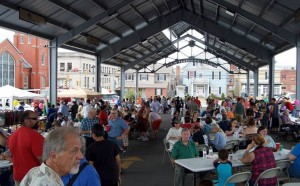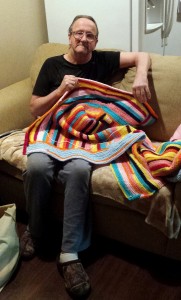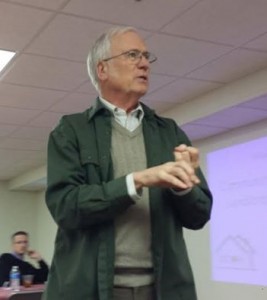
Over 400 people join homeless persons on Meet Your Neighbor day, judged to be the most diverse Morgantown event in anyone’s memory, as people from across the community gather to enjoy being together for food, fun and entertainment.
The Synod of the Trinity is now contributing to the elimination of homelessness in Morgantown, WV, through a $7,000 Network Grant to the Coordinating Council on Homelessness (CCOH) there.
“We are thrilled to have the Synod join as a partner in addressing homelessness in our area,” said the Rev. John Sonnenday, Executive Director of CCOH. “The Morgantown area has many excellent service agencies addressing the needs of persons who are homeless. But it wasn’t until there was a coordinated, community-wide approach that the number of persons who are homeless began to go down. Since January of 2013, the number has been cut in half, from 120 to 65 persons today.”
This community-wide approach is being led by CCOH. By coordinating the work of agencies, government entities, businesses, faith communities and private citizens, CCOH helps everyone focus their money and their effort on the actions that are most effective in actually reducing homelessness.
Presbyterians are very active in this work. In addition to Sonnenday, who is an honorably retired member of West Virginia Presbytery, the chair of the council is Ruling Elder George W. Lilley of the First Presbyterian Church in Morgantown. And the First PC of Morgantown has been serving a free pancake breakfast for homeless and other low-income persons every Sunday morning for over 20 years and also provided space this past year as an emergency cold shelter on weekends.
CCOH coordinates the work of 20 area agencies that serve persons experiencing homelessness. The agency directors meet regularly to align priorities and identify areas of better collaboration. Case workers from the agencies meet every week to review the needs of persons who are dealing with homelessness or the threat of homelessness.
“We are very fortunate to have this high commitment from our case workers, meeting every single week so that they can stay right on top of people’s needs and progress,” Sonnenday said. “This coordinated case work is one of the major reasons for increased success in helping people gain housing and maintain it.”
Laura Jones, Executive Director of the local free clinic, is also a member of First Presbyterian Church. She has been working with homeless individuals in the area for more than 15 years and has personally witnessed this success.
“Under the Council’s leadership, we are now truly working together as a team, and we are making more progress on reducing homelessness than ever before,” she said.
Because of the coordinated approach, the community was able to win a $100,000 grant in 2013 from the federal Department of Housing and Urban Development to help pay for initial costs of moving into housing, such as deposit, rent and utility start-ups. Due to the community’s progress in reducing homelessness, the HUD grants this year total nearly $200,000. In addition to the Synod grant, CCOH is supported by local foundations, the United Way, faith communities and many individuals.
Keri DeMasi, Executive Director of Bartlett House, the local emergency shelter, knows first-hand the value of that cooperation.

John N. sits in his new apartment with some of his handiwork after several years living in a cardboard box.
“The CCOH has served as a mechanism of social responsibility for our community by bringing together social service organizations, governmental agencies, private enterprise and community members to recognize that homelessness is a community problem which requires a community effort to address,” she said.
The growing success under CCOH’s leadership has been recognized across the community. Keri has received the Social Justice Award of the League of Women Voters, been identified by the local newspaper as an “Ambassador for Progress” and has been presented with the “Four Way Test Award” from the local Rotary Club, all for the work the council is doing to reduce homelessness.
“The Synod’s contribution is part of increasingly wide-spread support we are receiving,” reported Sonnenday. “That support, coupled with the significant reduction of homelessness in just a few years, gives us hope that eliminating homelessness in our area is a very realistic possibility. On behalf of all the people struggling to regain stable housing, we are very grateful for each and every offer of support.”
Note: A network is two or more groups of people responding to Jesus’ call who are passionate about a common interest or concern and connect with one another in a variety of ways. To learn more about the Synod of the Trinity’s Network Grants, click here.

